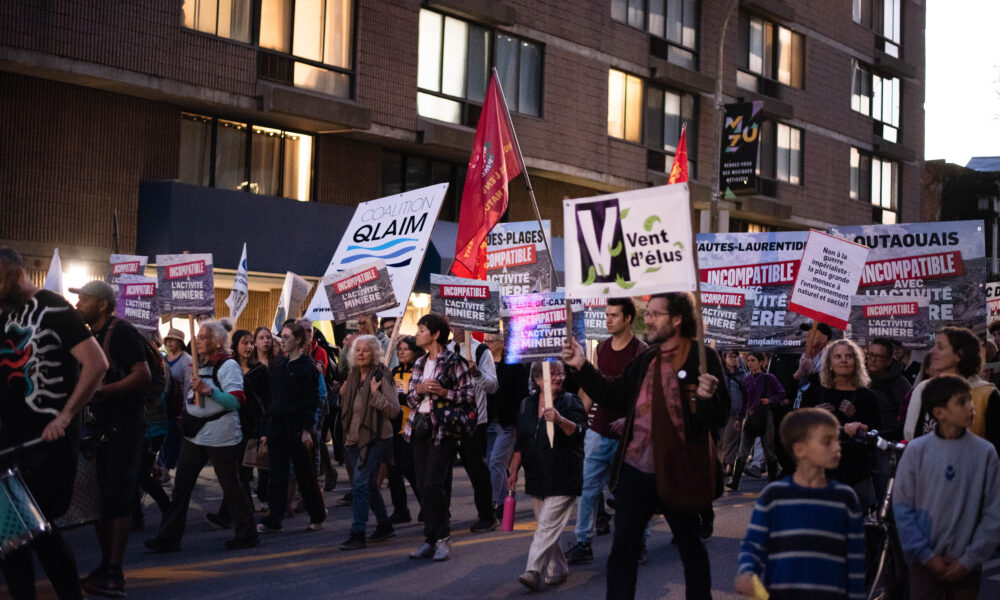Over 400 people gathered at Monument à sir George-Étienne Cartier for Montreal’s annual climate march at 6:00 p.m. on Sept. 27. Ensemble pour la suite du monde—a collective of unions, activist organizations, and other groups—organized the march as part of a series of demonstrations happening across Quebec that day.
As the sun set, protestors filled Avenue du Parc, carrying cardboard signs, bikes, and drums. The march took protestors down Rue Sherbrooke, past Roddick Gates, and ended in Dorchester Square at roughly 8:30 p.m., where several speakers took to a small stage to demand that the provincial government pursue democratically-governed action to mitigate climate change.
A contingent of students from McGill also attended the march. Among them was Rebecca Hamilton, U2 Arts, who called for greater student involvement in climate justice activism at the university. Hamilton went on to stress the importance of community for collective action against climate change.
“That’s what brought me out—the desire to be together with other people,” Hamilton said. “I feel excited about being at this broader action because it’s bringing together so many different sectors of Quebec civil society united by a shared vision for a democratic social-ecological transition.”
Hamilton urged the university to do its part to ensure a sustainable future through actions such as changing to renewable sources of heating, transforming its food systems, and subsidizing student passes to public transportation.
Tamara Ghandour, U3 Science, who is involved in climate organizing at McGill, told The Tribune that they have been attending the march for the past several years. Ghandour explained that the climate march is an opportunity to rally students around the cause and to “set a precedent” for such mobilization at McGill. They noted that, although McGill committed to divesting from direct holdings in Carbon Underground 200 fossil fuel companies in December 2023, the university is still indirectly investing in companies contributing to climate injustice.
“[McGill is] still investing in TD, which funded the Coastal GasLink project and a lot of pipeline projects on Indigenous territories in Canada,” Ghandour said. “Then also, obviously, McGill is investing in the genocide in Palestine, which is causing so much environmental damage. Carpet bombing releases a lot of carbon dioxide.”
In an email to The Tribune, the McGill Media Relations Office (MRO) explained that the university has taken several actions which “demonstrate the University’s environmental commitment.” These measures include McGill’s switch from natural-gas boilers to electric builders, which they estimate will reduce energy-related greenhouse gas emissions by 9000 tonnes CO2 equivalent per year. In addition, the MRO highlighted McGill’s support of sustainability initiatives on campus through the Sustainability Projects Fund, and their earning of a platinum sustainability rating under the Sustainability Tracking, Assessment, & Rating System in 2024.
The MRO also wrote that McGill’s Board of Governors has mandated the Committee on Sustainability and Social Responsibility (CSSR) of the Board of Governors to explore divestment from companies that derive the majority of their revenue from the manufacture of weapons. Staff and students can share their opinions on this topic to the CSSR until Oct. 1 through a webform.
When the march reached Dorchester Square, three speakers took turns addressing the crowd. President of the Fédération du personnel de soutien de l’enseignement supérieur within the Centrale des syndicats du Québec, Anne Dionne, spoke on behalf of the labour movement. Dionne demanded that the provincial government under François Legault listen to citizens and that decision-making surrounding climate justice be democratic.
“As a society, we have a responsibility to protect our environment while guaranteeing decent living conditions for all,” Dionne said. “Workers’ rights advocates […] play a fundamental role. We have a duty to intervene to ensure that environmental policies are fair, inclusive, and respectful of all.”*
Marie Maltais—a Cegep student at Sainte-Foy in Quebec City—also took to the stage to represent the youth movement. Maltais argued that, although five years have passed since hundreds of thousands of protestors marched in 2019 to demand change, institutions—including the Quebec government—have yet to take action. Maltais also denounced collegiate institutions for failing to draw adequate attention to climate justice in many of their courses.
“Now is the time to stop encroaching on our time and that of the next generation,” Maltais said, “We are asking today that yesterday’s promises be kept, that is, to reduce greenhouse gas emissions, protect biodiversity, considerably reduce the production and accumulation of waste, and put in place a real energy transition plan for Quebec, in addition to starting a reform of education.”*
*This quote has been translated from French.









